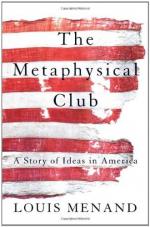
|
| Name: _________________________ | Period: ___________________ |
This test consists of 5 multiple choice questions, 5 short answer questions, and 10 short essay questions.
Multiple Choice Questions
1. In 1897 _________ made a speech during a monument dedication to Colonel Robert Gould Shaw.
(a) Josiah Nott.
(b) William James.
(c) Charles Darwin.
(d) Louis Agassiz.
2. ___________was a physician from Montgomery, Alabama that did not agree with slavery but was afraid of Black people.
(a) George Glidden.
(b) William James.
(c) Josiah Nott.
(d) Louis Agassiz.
3. Henry James Sr. was born again during the _________.
(a) Great Second Awakening.
(b) Transcendentalist Movement.
(c) Civil War.
(d) Awakening.
4. Benjamin and Charles caused fear in the United States because of their use of ___________ in the trial.
(a) Signatures.
(b) Statistics.
(c) Witnesses.
(d) Fear tactics.
5. Holmes' experiences during the war led him to believe that imposing one's beliefs would always lead to __________.
(a) Peace.
(b) Slavery.
(c) Violence.
(d) Change.
Short Answer Questions
1. Agassiz wrote a letter to ________ stating that he had not found any real evidence of the Ice Age in South America.
2. After teaching high school in Pennsylvania, John Dewey enrolled at _________ in 1882.
3. Unlike Darwin, Charles Pierce did not believe that randomness __________.
4. ________ was an officer in the Union Army and was known to many as Captain for the rest of his life.
5. When the expedition to Brazil returned, _________ gave lectures about evidence of the Ice Age in Brazil.
Short Essay Questions
1. What was based on a combination of the theory of probability and statistics?
2. Why did many of the Civil War soldiers felt their friends and family were dying during the war?
3. Why did John Dewey eventually become interested in philosophy as the main direction of his work?
4. What did Agassiz want to prove about the fish that James caught while traveling in Brazil?
5. What was in the essay that James read by a French philosopher which helped him to gain insight into two things?
6. Though John Dewey was often considered to be a liberal, what were some of his true views?
7. Define Charles Darwin's idea of natural selection in conjunction with the theory of evolution.
8. What did the Civil War allow Congress to create as it became more active than any other time in history?
9. Why was Boston the financial center for all cotton products in the mid 19th century?
10. What did Quetlet use the method of least squares for when he was doing his own research?
|
This section contains 626 words (approx. 3 pages at 300 words per page) |

|




